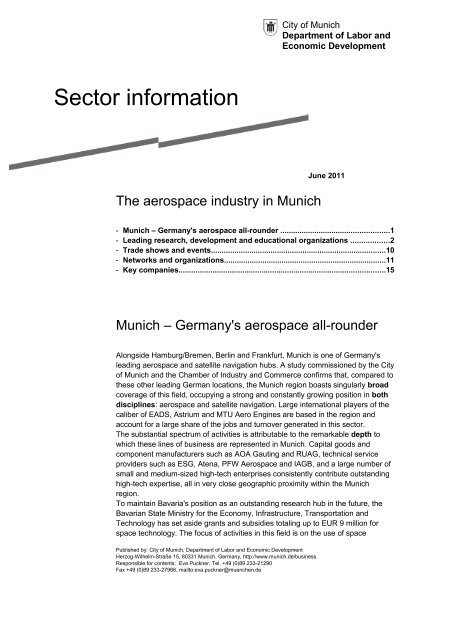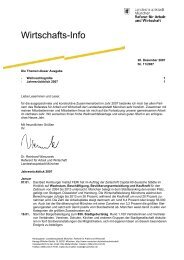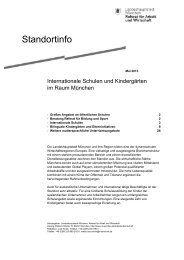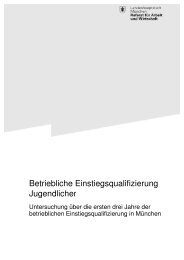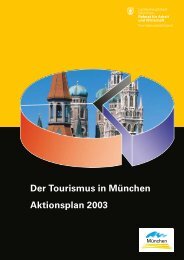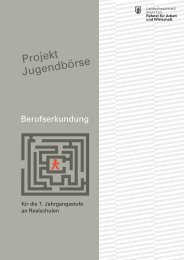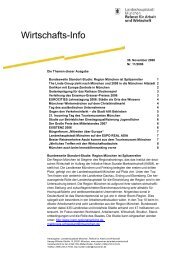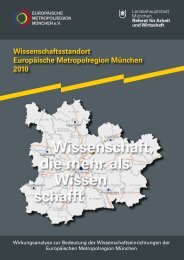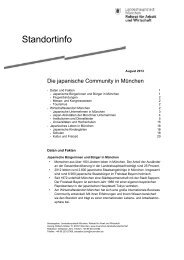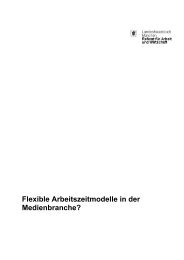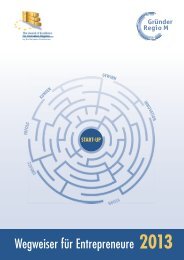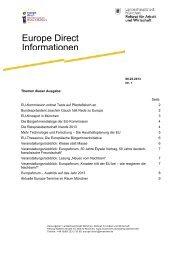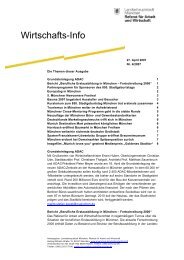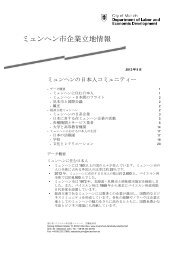Sector information - Referat für Arbeit und Wirtschaft
Sector information - Referat für Arbeit und Wirtschaft
Sector information - Referat für Arbeit und Wirtschaft
Create successful ePaper yourself
Turn your PDF publications into a flip-book with our unique Google optimized e-Paper software.
<strong>Sector</strong> <strong>information</strong><br />
The aerospace industry in Munich<br />
June 2011<br />
- Munich – Germany's aerospace all-ro<strong>und</strong>er ...................................................1<br />
- Leading research, development and educational organizations ..................2<br />
- Trade shows and events..................................................................................10<br />
- Networks and organizations............................................................................11<br />
- Key companies.................................................................................................15<br />
Munich – Germany's aerospace all-ro<strong>und</strong>er<br />
Alongside Hamburg/Bremen, Berlin and Frankfurt, Munich is one of Germany's<br />
leading aerospace and satellite navigation hubs. A study commissioned by the City<br />
of Munich and the Chamber of Industry and Commerce confirms that, compared to<br />
these other leading German locations, the Munich region boasts singularly broad<br />
coverage of this field, occupying a strong and constantly growing position in both<br />
disciplines: aerospace and satellite navigation. Large international players of the<br />
caliber of EADS, Astrium and MTU Aero Engines are based in the region and<br />
account for a large share of the jobs and turnover generated in this sector.<br />
The substantial spectrum of activities is attributable to the remarkable depth to<br />
which these lines of business are represented in Munich. Capital goods and<br />
component manufacturers such as AOA Gauting and RUAG, technical service<br />
providers such as ESG, Atena, PFW Aerospace and IAGB, and a large number of<br />
small and medium-sized high-tech enterprises consistently contribute outstanding<br />
high-tech expertise, all in very close geographic proximity within the Munich<br />
region.<br />
To maintain Bavaria's position as an outstanding research hub in the future, the<br />
Bavarian State Ministry for the Economy, Infrastructure, Transportation and<br />
Technology has set aside grants and subsidies totaling up to EUR 9 million for<br />
space technology. The focus of activities in this field is on the use of space<br />
Published by: City of Munich, Department of Labor and Economic Development<br />
Herzog-Wilhelm-Straße 15, 80331 Munich, Germany, http://www.munich.de/business<br />
Responsible for contents: Eva Puckner, Tel. +49 (0)89 233-21290<br />
Fax +49 (0)89 233-27966, mailto:eva.puckner@muenchen.de<br />
City of Munich<br />
Department of Labor and<br />
Economic Development
technology in general and GMES, SatNav and SatKom in particular.<br />
Leading research, development and<br />
educational organizations<br />
City of Munich<br />
Department of Labor and<br />
Economic Development<br />
November 2010<br />
Two resources in particular – creativity and knowledge – are very important to<br />
the prosperity and future economic competitiveness of international business hubs.<br />
An industry's creative potential and its depth of knowledge and expertise are telling<br />
indicators of its ability to innovate. Innovation in turn is vital if an industry is to<br />
remain agile and adaptive while still asserting its presence in the face of global<br />
competition. Compared to other international business centers, Munich's rich<br />
economic diversity, the quality of its soft factors and the high standard of its wide<br />
range of educational establishments give the city an enviable standing in both<br />
highly qualified and highly creative disciplines.<br />
The magnetic pull that the Bavarian capital exerts on creative talents and highly<br />
qualified individuals from aro<strong>und</strong> the globe is reflected in the number of registered<br />
patents. This statistic alone singles Munich out as one of the world's foremost<br />
high-tech locations. Bavarian inventors registered 12,641 patents in 2009 – fully<br />
26.4% of all patents registered in Germany. Bavaria is thus second only to Baden-<br />
Württemberg, its southern German neighbor, as the leading state on this score.<br />
Munich-based companies are largely responsible for this pre-eminent position. In<br />
2009, Siemens ranked third (1,750) in terms of the total number of patent<br />
registrations in Germany. Two other major Munich-based key players – BMW and<br />
Infineon – ranked tenth and twelfth respectively.<br />
A further powerful indicator of a region's innovative potential is naturally the scope<br />
of research and development (R&D) activities covered by the corporate sector.<br />
As a general rule, major international corporations tend to be overweight on R&D<br />
compared to smaller firms.<br />
Yet another key reason for Munich's international reputation as a leading high-tech<br />
knowledge cluster is, of course, the outstanding knowledge landscape afforded by<br />
highly regarded universities and respected research organizations. Munich has:<br />
page 2
14 respected universities<br />
¯ TUM (Technische Universität München)<br />
¯ LMU (Ludwig Maximilians Universität)<br />
¯ Munich University of Applied Sciences<br />
¯ University of the Federal Armed Forces<br />
Ten other institutions of higher education<br />
¯<br />
City of Munich<br />
Department of Labor and<br />
Economic Development<br />
November 2010<br />
Non-university research organizations<br />
¯ The Fraunhofer Society (with its national headquarters and four individual<br />
institutes in the Munich region)<br />
¯ The Max Planck Society (with its national headquarters and eleven<br />
individual institutes in the Munich region)<br />
¯ The Helmholtz Zentrum München (Helmholtz Center Munich, a research<br />
organization run jointly by federal government and the Free State of Bavaria<br />
and featuring 31 scientific institutes and independent departments). This<br />
center focuses on research into health and the environment and is a<br />
member of the Helmholtz Association of German Research Centers<br />
¯ DLR, the German Aerospace Agency (with eight scientific institutes at its<br />
Oberpfaffenhofen campus)<br />
At present, the following organizations conduct focused aerospace research and<br />
development in and aro<strong>und</strong> Munich.<br />
Munich Aerospace faculty<br />
http://www.bauhaus-luftfahrt.net/<br />
Munich Aerospace, a joint faculty of the Technische Universität München (TUM),<br />
the University of the Federal Armed Forces, the German Aerospace Agency (DLR)<br />
and Bauhaus Luftfahrt, was fo<strong>und</strong>ed in July 2010. The Munich Aerospace faculty<br />
will draw on the expertise of aro<strong>und</strong> 55 professorial chairs to integrate industrial<br />
research and manufacturing skills.<br />
The faculty will initially focus on three specific research networks: Autonomous<br />
Flight Systems (coordinated by the TUM), Safety in Orbit (coordinated by by<br />
UniBwM) and Geodetic Earth Observation (coordinated by DLR). The May 2011<br />
signing of a framework, research and scholarship program marked the official start<br />
of the faculty's programs to encourage the development of up-and-coming<br />
scientists.<br />
page 3
November 2010<br />
The German Aerospace Agency (DLR) in Oberpfaffenhofen<br />
Deutsches Zentrum <strong>für</strong> Luft- <strong>und</strong> Raumfahrt e.V.<br />
http://www.dlr.de<br />
The DLR campus in Oberpfaffenhofen is the second-largest research facility in<br />
Germany, after Cologne. Some 1,600 people currently work here. The Bavarian<br />
research center focuses on participation in space travel missions, climate<br />
research, research and development in the field of earth observation, the<br />
development of navigation systems and the improvement of robotic systems.<br />
The new Galileo Control Center – a core element in the agency's gro<strong>und</strong>-based<br />
services – was opened here in September 2008. Satellites are controlled and<br />
mission data is received via a network of control centers spread aro<strong>und</strong> the globe.<br />
In July 2010, a new Earth Observation Center (EOC) was likewise opened in<br />
Oberpfaffenhofen. This center combines what used to be the German Remote<br />
Sensing Data Center (DFD) and the Remote Sensing Technology Institute (IMF).<br />
At the EOC's converted and partially refurbished facility on the DLR premises,<br />
some 300 researchers are now devoted to b<strong>und</strong>ling and analyzing remote sensing<br />
data.<br />
The DLR campus in Oberpfaffenhofen comprises the following institutes:<br />
Cluster for Applied Remote Sensing (C-AF)<br />
http://www.dlr.de/caf/<br />
Directors: Professor Stefan Dech and Professor Richard Bamler<br />
Focused on research into remote sensing, this cluster develops methods of<br />
scientific analysis and application-oriented solutions for the environment and the<br />
climate, mobility and planning, law and order, and the prevention and management<br />
of natural disasters. It operates satellite receiver stations in and outside Germany,<br />
distributes data and <strong>information</strong> products to users and provides long-term<br />
archiving for all data. The cluster collaborates closely with research organizations,<br />
universities and users in both the public and private sectors. It also trains up-andcoming<br />
academics in a broad spectrum of science and engineering disciplines.<br />
German Remote Sensing Data Center (DFD)<br />
http://www.dlr.de/caf/institut/dfd<br />
Director: Professor Stefan Dech<br />
City of Munich<br />
Department of Labor and<br />
Economic Development<br />
page 4
City of Munich<br />
Department of Labor and<br />
Economic Development<br />
November 2010<br />
The German Remote Sensing Data Center develops and operates a global<br />
network of receiver stations for remote sensing data. It actively supports the<br />
advancement both the scientific and commercial use of remote sensing<br />
technology. This is done by developing methods and processes to create data<br />
products that serve users' practical needs in relation to the environment,<br />
safety/security issues, geo<strong>information</strong>, the climate and the atmosphere.<br />
Remote Sensing Technology Institute (IMF)<br />
http://www.dlr.de/caf/institut/imf<br />
Director: Professor Richard Bamler<br />
As its name suggests, the IMF researches and develops remote sensing<br />
technologies. Its activities focus primarily on methodologies, technologies and<br />
processing systems to condense remote sensing data and archives into valuable<br />
<strong>information</strong>.<br />
Microwave and Radar Institute<br />
http://www.dlr.de/hr<br />
Director: Professor Alberto Moreira<br />
The Microwave and Radar Institute is one of the driving force behind development<br />
of the Synthetic Aperture Radar (SAR) observation system. Originally developed to<br />
monitor military targets, this advanced technology is now used by prospecting<br />
geologists to locate possible oil fields, to alert shipping companies to the<br />
whereabouts of icebergs, and to help emergency response teams deal with floods,<br />
earthquakes and other natural disasters.<br />
Institute of Communications and Navigation<br />
http://www.dlr.de/kn<br />
Director: Professor Christoph Günther<br />
This institute's chief mission is to oversee the Galileo project, which should<br />
ultimately compete with the Global Positioning System (GPS) that is <strong>und</strong>er US<br />
American military control. Galileo consists of 27 satellites (plus three substitutes)<br />
that orbit the planet 24,000 kilometers above the Earth's surface and are available<br />
to terrestrial transmission stations. Pilot operation of the first four Galileo satellites<br />
will probably commence in 2011. The total cost of providing this system is<br />
estimated at at least EUR 3.6 billion.<br />
page 5
City of Munich<br />
Department of Labor and<br />
Economic Development<br />
November 2010<br />
Institute of Atmospheric Physics<br />
http://www.dlr.de/pa/<br />
Director: Professor Ulrich Schumann<br />
The Institute of Atmospheric Physics focuses on research into physical and<br />
chemical processes in the Earth's atmosphere, the troposphere and the<br />
stratosphere. A thorough knowledge of dynamic global and regional cloud physics<br />
and chemical processes is f<strong>und</strong>amental to many aerospace applications.<br />
Understanding the Earth's atmosphere is likewise essential if we are to assess the<br />
impact on the climate of the harmful emissions given off by air and road traffic in<br />
specific regions and aro<strong>und</strong> the world. Much of the data used by this institute in the<br />
course of its work is supplied by other DLR institutes in Oberpfaffenhofen.<br />
Institute of Robotics and Mechatronics<br />
www.robotic.de<br />
Director: Professor Gerd Hirzinger<br />
Headed by Gerd Hirzinger, a seminal figure in robotics, this is one of the largest<br />
and most successful institutes of its kind in Europe. Software and hardware<br />
developed by the Institute of Robotics and Mechatronics has been instrumental in<br />
giving leading German manufacturers of industrial robots a significantly sharper<br />
competitive edge. What often so<strong>und</strong>s like science fiction to the layperson is<br />
already becoming reality at DLR. A few years from now, robots built in<br />
Oberpfaffenhofen are to be sent into space to do work currently being handled by<br />
astronauts.<br />
Space Operations and Astronaut Training<br />
http://www.dlr.de/rb/<br />
Professor Felix Huber<br />
DLR Space Operations is the central facility for spaceflight operations in Germany.<br />
It is responsible for satellite missions for Earth observation, communication and<br />
reconnaissance as well as for the exploration of the solar system and human<br />
spaceflight missions. The center also trains astronauts, prepares experiments and<br />
develops so<strong>und</strong>ing rockets to be launched from sites aro<strong>und</strong> the world. In addition,<br />
DLR Space Operations is working on new technologies such as on-orbit servicing<br />
in order to master even the most challenging space projects in future.<br />
page 6
November 2010<br />
German Aerospace Center for Flight Operations<br />
http://www.dlr.de/fb<br />
Director: Guido Plützer<br />
Chief technology officer: Oliver Brieger<br />
DLR operates the largest non-military fleet of research aircraft in Europe. The<br />
aircraft themselves serve both as the object of aviation research and as a platform<br />
for the launch of scientific equipment used by teams of researchers to monitor the<br />
Earth, its oceans and its atmosphere.<br />
Technische Universität München (TUM)<br />
The Technical University of Munich is recognized as one of Germany's elite<br />
universities. 24,394 students are enrolled here (winter 2009/2010), and the<br />
university (including the hospital) had aro<strong>und</strong> 8,500 people on its payroll in 2009.<br />
The TUM's strong focus on research is <strong>und</strong>erscored by the number of doctorates<br />
(788 in 2009) and state doctorates awarded (60 in 2009). Moreover, its impressive<br />
research performance is reflected in the total of EUR 218 million in third-party<br />
research f<strong>und</strong>s allocated to the university (including the hospital) in 2009.<br />
Institute of Aerospace Systems<br />
http://www.lltlls.mw.tum.de/<br />
Professor Mirko Hornung<br />
The Institute for Aerospace Systems has an integrative focus, covering aerospace<br />
systems in their entirety and addressing specific areas of research. Tuition<br />
primarily targets students of aerospace engineering.<br />
Chair of Space Transport Technologies<br />
Institute of Astronautics<br />
http://www.astronautics.de<br />
Professor Ulrich Walter<br />
The Institute of Astronautics concentrates on four areas of research: satellite<br />
design, applied systems engineering, human spaceflight and accelerator systems.<br />
Courses at the institute cover the f<strong>und</strong>amentals of rocket and space travel<br />
systems, but also explore the world of satellite technology. Students can specialize<br />
in satellite design, controlling the path and adjusting the position of spacecraft, and<br />
satellite-based navigation.<br />
page 7
November 2010<br />
Institute of Flight System Dynamics<br />
http://www.lfm.mw.tum.de<br />
Professor Florian Holzapfel, Professor Gottfried Sachs (retired), Professor Otto<br />
Wagner, Dr. Matthias Heller<br />
This institute concentrates on optimizing the mechanical and control systems used<br />
in flight systems, including modeling and simulation, flight dynamics, flight control,<br />
sensor systems, data fusion, estimation techniques and navigation, and trajectory<br />
optimization.<br />
Institute of Aerodynamics<br />
http://www.aer.mw.tum.de<br />
Professor N. Adams, Professor Albert Pernpeintner, Professor Christian<br />
Breitsamter, Professor Christian Stemmer<br />
Research at this chair focuses on investigating aircraft and vehicle aerodynamics,<br />
designing aircraft wings and designing noise reduction hangars at major airports.<br />
Institute of Flight Propulsion<br />
http://www.lfa.mw.tum.de<br />
Professor Hans-Peter Kau<br />
This chair applies itself to the performance of gas turbines, jet and rocket<br />
propulsion systems, and the numerical simulation of complex compressor flows.<br />
Institute of Lightweight Structures<br />
http://www.llb.mw.tum.de<br />
Professor Horst Baier<br />
This chair focuses on design and materials, analysis and simulation, production<br />
and testing for lightweight structures in aerospace contexts.<br />
Institute of Astronomical and Physical Geodesy (IAPG)<br />
http://tau.fesg.tu-muenchen.de<br />
Professor Roland Pail, Professor Urs Hugentobler, Professor Florian Seitz<br />
This Institute of Astronomical and Physical Geodesy (headed by Professor Pail),<br />
the Faculty of Satellite Geodesy (Professor Hugentobler) and a junior<br />
professorship for Earth-Oriented Space Science and Technology (Professor Seitz)<br />
are all subsumed <strong>und</strong>er this institute. Research at the IAPG addresses themes<br />
such as the scientific application of satellite-based navigation systems, plotting<br />
satellite orbit trajectories, the GOCE satellite mission, gravity field determination,<br />
inertial survey systems and the pilot network in the Ester mountain range.<br />
page 8
November 2010<br />
Munich University of Applied Sciences<br />
http://www.fh-muenchen.de<br />
The "FH Munich" – one of Germany's largest universities of applied sciences –<br />
currently offers more than 60 "Diplom", bachelor's and master's courses. The<br />
university's more than 14,500 students are served by a total of some 470<br />
professors, 460 staff and about 600 lecturers. Munich University of Applied<br />
Sciences' consistent commitment to quality is reflected in the fact that every one of<br />
the master's courses currently on offer is already either accredited or in the<br />
process of being accredited.<br />
Department of Aeronautical Engineering<br />
http://www.fm.fh-muenchen.de<br />
Dean: Professor Clemens Klippel<br />
Students in this department are involved in designing aviation components and<br />
formulating high-efficiency production methods.<br />
University of the Federal Armed Forces<br />
Faculty of Aerospace<br />
http://www.unibw.de/lrt/<br />
Dean: Professor Christian M<strong>und</strong>t<br />
The Faculty of Aerospace oversees courses in aerospatial engineering at the<br />
University of the Federal Armed Forces in Munich. Students can choose either the<br />
Aerospatial Engineering or the Technology and Innovation Management course.<br />
The 15 institutes subsumed <strong>und</strong>er this faculty devote themselves to the study of<br />
lightweight structures, flow systems, aerodynamics and space systems, for<br />
example.<br />
Max Planck Institute for Extraterrestrial Physics<br />
http://www.mpe.mpg.de<br />
Director: Dr. Kirpal Nandra<br />
Fo<strong>und</strong>ed in 1963 as a sub-institute of the Max Planck Institute for Physics and<br />
Astrophysics in Munich, this organization was established as an independent<br />
page 9
November 2010<br />
institute in 1991. Its principal research topics are astronomic observations in<br />
spectral ranges (such as remote infrared, X-rays and gamma rays) that can only<br />
be studied from space because of the absorbent effects of the Earth's atmosphere,<br />
and in-situ measurements in near-Earth space to investigate the collisionless<br />
interaction of cosmic plasmas.<br />
Trade shows and events<br />
Automatica<br />
June 12-20, 2012<br />
New Munich Exhibition Center<br />
http://www.automatica-muenchen.de/<br />
Material assembly and handling systems, robots, industrial image processing,<br />
positioning systems and propulsion systems for the automotive, medical,<br />
electronics and other sectors.<br />
INTER AIRPORT EUROPE<br />
18th International Exhibition for Airport Equipment, Technology, Design & Service<br />
October 11-14, 2010<br />
INTER AIRPORT EUROPE is the leading international event for the international<br />
airport industry. Buyers, traders, consultants, developers and architects focusing<br />
on every aspect of the airport business attend this premier exhibition, which covers<br />
the entire spectrum of airport equipment, technology, design and service. The<br />
previous exhibition (in October 2007) broke all records, attracting more than 600<br />
exhibitors and 13,000 trade visitors from all over the world.<br />
page 10
Networks and organizations<br />
November 2010<br />
bavAIRia e.V.<br />
Sonderflughafen Oberpfaffenhofen<br />
Friedrichshafener Strasse 1<br />
82205 Gilching<br />
Phone: +49 (0)8105 272927-0<br />
Fax: +49 (0)8105 272927-15<br />
Dr. Martin Haunschild, Susanne Seige<br />
mailto:info@bavAIRia.net<br />
http://www.bavairia.net<br />
Launched in September 2006, bavAIRia e.V. is tasked with fostering closer<br />
collaboration and triggering innovative projects in Bavaria's aerospace and satellite<br />
navigation industry. Its 44 member organizations represent the business and<br />
scientific communities.<br />
Anwendungszentrum GmbH Oberpfaffenhofen<br />
Friedrichshafener Strasse 1<br />
82205 Gilching<br />
Phone: +49 (0)8105 77277-10<br />
Fax: +49 (0)8105 77277-55<br />
mailto:info@anwendungszentrum.de<br />
http://www.anwendungszentrum.de<br />
Managing Director: Thorsten Rudolph<br />
Based at the Oberpfaffenhofen aerospace hub, the "Application Center"<br />
concentrates on satellite navigation activities. Its mission is to support both<br />
startups and the relocation of companies that develop and wish to market products<br />
and services relating to satellite navigation.<br />
Launched at the end of 2001 and officially opened in January 2003, the center has<br />
so far helped 20 entrepreneurs to set up new firms at this location.<br />
page 11
Other organizations<br />
November 2010<br />
Bayern Innovativ<br />
Managing Director: Professor Josef Nassauer<br />
Gesellschaft <strong>für</strong> Innovation <strong>und</strong> Wissenstransfer mbH<br />
Gewerbemuseumsplatz 2<br />
90403 Nürnberg<br />
Phone: +49 (0)911 20671-0<br />
Fax: +49 (0)911 20671-792<br />
mailto:info@bayern-innovativ.de<br />
http://www.bayern-innovativ.de<br />
Since its inception in 1995, Bayern Innovativ ("Innovative Bavaria") has initiated<br />
several thousand regional, national and international cooperative ventures,<br />
established a network of customers and partners that comprises 55,000 firms and<br />
500 scientific institutes from 50 countries, and prepared high-quality events and<br />
websites that have attracted many investors and scientists to Bavaria.<br />
Bayerische Patentallianz GmbH<br />
Managing Director: Peer Biskup<br />
Nussbaumstrasse 12<br />
80336 München<br />
Phone: +49 (0)89 5480177-0<br />
Fax: +49 (0)89 5480177-99<br />
mailto:kontakt@baypat.de<br />
http://www.baypat.de/<br />
The "Bavarian Patent Alliance", established in January 2007, acts as a patent<br />
licensing agency, valuing and marketing the inventions of over 16,000 universitybased<br />
scientists and engineers in Bavaria. Acting as a link between science and<br />
the business community, its aim is to empower industry to commercially exploit the<br />
excellent inventions that are discovered by Bavaria's universities/universities of<br />
applied sciences and whose industrial property rights are protected.<br />
Bavarian State Ministry for the Economy,<br />
Infrastructure, Transportation and Technology<br />
Invest in Bavaria<br />
Manager Aerospace | Satellite Navigation: Ursula Sieh<br />
Prinzregentenstr. 28<br />
80538 München<br />
page 12
Phone: +49 (0)89 2162-2388<br />
Fax: +49 (0)89 2162-2803<br />
mailto:ursula.sieh@invest-in-bavaria.de<br />
www.invest-in-bavaria.de<br />
November 2010<br />
Director: Dr. Johann Niggl<br />
Prinzregentenstr. 28<br />
80538 München<br />
Phone: +49 (0)89 2162-2642<br />
Fax: +49 (0)89 2162-2803<br />
mailto: info@invest-in-bavaria.de<br />
http://www.invest-in-bavaria.de<br />
Invest in Bavaria is the relocation agency operated jointly by the Bavarian Ministry<br />
for the Economy and Bayern International GmbH. The team assists investors who<br />
are looking to move to or expand their business in Bavaria, providing <strong>information</strong>,<br />
helping with the search for suitable premises and putting investors in touch with<br />
local authorities, partners and networks.<br />
City of Munich<br />
Department of Labor and Economic Development<br />
Director: Kurt Kapp<br />
Herzog-Wilhelm-Str. 15<br />
80331 München<br />
Economic Development<br />
Phone: +49 (0)89 233-22402<br />
Fax: +49 (0)89 233-27966<br />
mailto:wirtschaftsfoerderung@muenchen.de<br />
http://www.wirtschaft.muenchen.de<br />
The Department of Labor and Economic Development provides an array of<br />
professional services to companies that are based in or considering moving to<br />
Munich. Corporate customers are given a single point of contact to walk them<br />
through the various administrative requirements. Advice on where and how to<br />
move is also available, as are support for business startups, <strong>information</strong> on the<br />
availability of suitable premises and a contact service to put firms in touch with the<br />
right authorities, chambers of industry and commerce, networks and associations.<br />
The department also supplies a wealth of <strong>information</strong> about the rich diversity of<br />
Munich as a place to do business.<br />
page 13
November 2010<br />
Chamber of Industry and Commerce for Munich and Upper Bavaria<br />
Industry, Innovation and the Environment<br />
Director: Dr. Stefan Wimbauer<br />
Max-Joseph-Strasse 2<br />
80333 München<br />
Phone: +49 (0)89 5116-321<br />
Fax: +49 (0)89 5116-8341<br />
mailto:wimbauer@muenchen.ihk.de<br />
http://www.muenchen.ihk.de<br />
Representing industrial, trading and service companies in the region, the Chamber<br />
of Industry and Commerce is committed to improving conditions for the business<br />
community. The chamber sees itself as a parliament that represents the interests<br />
of the business community to government and administrative bodies and the public<br />
at large. It also provides services (such as consulting) to companies, assumes<br />
responsibilities on behalf of the public sector (such as examinations in the context<br />
of vocational training) and takes action to promote fair and sustainable business<br />
practices.<br />
Munich Network – Netzwerk München e.V.<br />
Prinzregentenstr. 18<br />
80538 München<br />
Phone: +49 (0)89 630253-0<br />
Fax: +49 (0)89 630253-10<br />
mailto:info@munichnetwork.com<br />
http://www.munichnetwork.com<br />
The Munich Network actively helps technology firms to get started, grow and<br />
remain successful in the long run. It brings them into contact with regional drivers<br />
of innovation and forges ties with the world's leading high-tech regions.<br />
page 14
Key companies<br />
November 2010<br />
AOA apparatebau gauting gmbh<br />
http://www.aoa-gauting.de<br />
This Gauting-based company produces and water supply and wastewater disposal<br />
systems, auxiliary air-conditioning systems, high-performance fans, sensor<br />
systems and fuel system components for aircraft.<br />
Assystem GmbH<br />
http://www.assystem-germany.com<br />
Assystem Aerospace Germany GmbH merged with Atena Engineering GmbH<br />
effective March 31, 2011. Since then, the company and its roughly 600 engineers<br />
and technicians have operated <strong>und</strong>er the name Assystem GmbH.<br />
EADS<br />
European Aeronautic Defense and Space Company<br />
http://www.eads.net<br />
EADS is a global leader in aerospace, defense and related services. Aircraft<br />
manufacturer Airbus belongs to the EADS Group, as does Eurocopter, the world's<br />
largest helicopter supplier. EADS also holds a stake in the MBDA joint venture<br />
company, the world's second-largest missile systems provider. The Group is the<br />
leading partner in the Eurofighter consortium and the key customer for the Ariane<br />
satellite-launching rocket. It also develops the A400M military airlifter and is the<br />
largest industrial partner to Europe's Galileo satellite navigation system.<br />
The Group's Strategy, Marketing and Legal functions are headquartered in Paris.<br />
Its Finance, Purchasing and Communication functions are headquartered in<br />
Munich.<br />
The following three Munich-based companies belong to the EADS Group:<br />
page 15
November 2010<br />
Astrium GmbH<br />
http://www.astrium.eads.net<br />
http://www.astrium.eads.net/de/locations/ottobrunn.html<br />
Astrium develops and produces end-to-end telecoms and observation systems for<br />
civilian and military applications, navigation programs, the full spectrum of aircraft<br />
technology and equipment for spacecraft.<br />
EADS Defence and Security Systems<br />
http://www.classic.eads.net/1024/de/businet/defence/defence.html<br />
EADS' Defence & Security (DS) division b<strong>und</strong>les the Group's key defense and<br />
security activities and drives the internal development of integrated system<br />
solutions that meet customers' requirement for networked operations<br />
management. The division thus combines the activities of three business units:<br />
Military Air Systems, Defence and Communications Systems and Defence<br />
Electronics.<br />
MDBA<br />
http://www.mbda.net<br />
MBDA, a global leader in guided missile systems, has operations worldwide. At<br />
present, the company offers 45 missile systems and defense programs and is a<br />
key supplier to major multinational projects. Fo<strong>und</strong>ed in 2001, the company<br />
brought together Europe's biggest companies in the missile sector (including<br />
Germany's EADS/LFK).<br />
ESG - Elektroniksystem- <strong>und</strong> Logistik-GmbH<br />
http://www.esg.de<br />
ESG is an international systems and software house that handles the development<br />
and service processes for software-intensive, complex and technologically<br />
sophisticated products in the security sector. The company has its roots in aviation<br />
systems.<br />
MT Aerospace AG<br />
http://www.mt-aerospace.de<br />
MT Aerospace covers a broad spectrum of aerospace products and services. It is<br />
a leading developer and manufacturer of subsystems and components for the<br />
Ariane rockets, orbital transfer systems and satellites. The company also supplies<br />
subsystems to Airbus, as well as building and providing services to launch<br />
facilities.<br />
page 16
November 2010<br />
IABG mbH<br />
http://www.iabg.de<br />
IABG is a name closely linked to space transport. The activities of its space<br />
transport test center, for example, are coordinated by the European Space Agency<br />
(ESA). Scarcely any major German or European space project conducted in recent<br />
decades has not involved the support of IABG.<br />
IfEN GmbH<br />
http://www.ifen.com<br />
This company is a leading designer of component testing systems. Processing,<br />
disseminating and augmenting satellite-derived signals is another focus of its<br />
activities. IfEN leads the German industrial consortium that, since 2002, has been<br />
developing GATE, a flexible, gro<strong>und</strong>-based testing and development environment<br />
for Galileo.<br />
GE Aircraft Engines<br />
http://www.geae.com<br />
The German subsidiary of one of the world's leading makers of jet engines is<br />
headquartered in Munich.<br />
GKN Aerospace GmbH<br />
http://www.gknplc.com<br />
Headquartered in the UK, this company designs, develops and manufactures highperformance<br />
structural composite components for the aerospace, transport and<br />
medical engineering industries.<br />
Kayser-Threde GmbH<br />
http://www.kayser-threde.de<br />
Kayser-Threde ranks among the leading aerospatial technology firms in Europe. It<br />
concentrates primarily on scientific instruments and systems for use in space<br />
missions, optical systems, space-borne telescopes, cameras, Earth observation,<br />
satellite-based geo<strong>information</strong> services, space travel systems for manned and<br />
unmanned missions, and systems to measure and store data for the automotive<br />
and aircraft industries.<br />
page 17
November 2010<br />
Ketek GmbH<br />
http://www.ketek.net<br />
This award-winning medium-sized firm develops, produces and markets specialpurpose<br />
semiconductor-based detector modules for use in X-ray spectroscopy.<br />
The most spectacular job given to the company's systems to date came during the<br />
Mars mission in early 2004, when detector modules from Ketek were used to<br />
investigate soil and rock samples on our neighboring planet.<br />
MTU Aero Engines<br />
http://www.mtu.de<br />
The headquarters of parent company MTU Aero Engines double up as the head<br />
office of MTU Maintenance. Aircraft engines are assembled and components<br />
manufactured in Munich and then shipped to all the major OEMs. The Munichbased<br />
company also produces spare parts and develops innovative repair and<br />
maintenance processes for deployment at MTU's subsidiaries.<br />
PFW Aerospace AG<br />
www.garner.de<br />
Aircraft construction company PFW Aerospace plays a part in building the world's<br />
biggest commercial airliners, including the entire Airbus range (A318-A380), the<br />
Boeing 787 and a variety of military aircraft.<br />
In 2009, the company acquired Oberpfaffenhofen-based Garner CAD Technik<br />
(GCT), whose activities focus primarily on designing and engineering aircraft and<br />
aircraft systems, plus a series of similar assignments and research contracts.<br />
RUAG Aerospace Deutschland GmbH<br />
http://www.ruag.com/ruag/juice<br />
This Swiss-owned company operates three subsidiaries in Oberpfaffenhofen.<br />
These firms provide maintenance services for civil and military aircraft, handle<br />
systems integration, manufacture assemblies and components, paint aircraft,<br />
handle completion services and also provide technical and logistical support. In<br />
addition, RUAG develops and produces structural and <strong>und</strong>erbody assemblies such<br />
as pressure bulkheads, fuselage sections, tail cones and floor structures for all<br />
Airbus aircraft.<br />
Sitec Aerospace<br />
http://www.sitec-aerospace.com<br />
page 18
November 2010<br />
Headquartered in Singapore, Sitec Aerospace manufactures actuators, valves,<br />
engine control systems and mechanical flight control systems.<br />
Telair International GmbH<br />
http://www.telair.com<br />
This US-owned company develops, produces and certifies cargo loading systems<br />
for wide-body aircraft. These services are provided on an OEM basis for Airbus<br />
and Boeing and on a buyer furnished equipment (BFE) basis for a large number of<br />
airlines.<br />
This sector <strong>information</strong> bulletin has been carefully researched and diligently compiled. Nevertheless, the City of<br />
Munich accepts no liability for incorrect or incomplete <strong>information</strong>. Please address any questions, comments or<br />
suggestions to Eva Puckner: mailto:eva.puckner@muenchen.de, +49 (0)89 233-21290<br />
page 19


